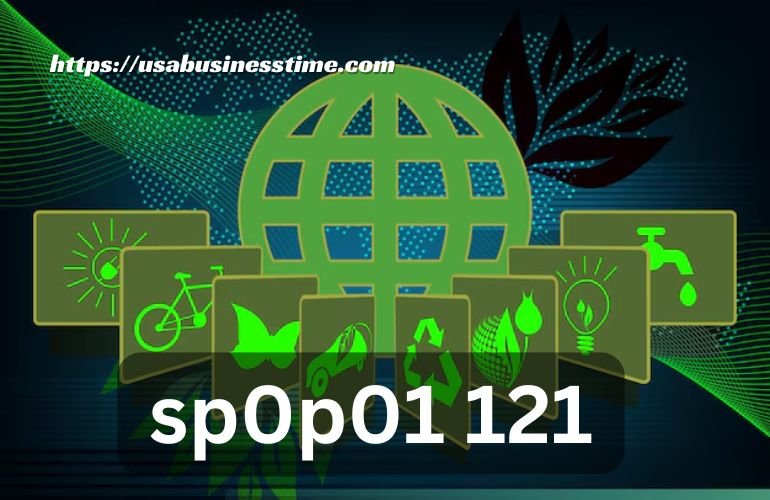sp0p01 121 represents a groundbreaking shift in the way industries approach technology and innovation. Its development has sparked conversations about the future of automation, efficiency, and connectivity. Emerging from a need to address modern challenges, it combines advanced features that promise to redefine key sectors.
Understanding its origins and potential is key to appreciating how it’s set to transform industries worldwide. From manufacturing to healthcare and beyond, sp0p01 121 is more than a tool—it’s a new standard for progress.
Table of Contents
Core Features and Capabilities of sp0p01 121
sp0p01 121 stands out due to its innovative combination of hardware and software that maximizes efficiency across various sectors. The system is equipped with cutting-edge sensors, advanced data analytics, and seamless connectivity that help businesses automate complex tasks with precision.

One of its defining features is its scalability, allowing it to adapt to both large corporations and small enterprises. It is designed to handle high volumes of data in real-time, making it ideal for industries that require fast and reliable processing, such as manufacturing and healthcare.
The integration of artificial intelligence (AI) into sp0p01 121 enhances its ability to learn and evolve, allowing it to optimize processes without human intervention. This feature reduces operational costs and minimizes human error, leading to faster decision-making and increased productivity.
The system’s user-friendly interface also contributes to its widespread adoption. With intuitive controls and customizable settings, it can be tailored to meet the specific needs of different industries, whether it’s improving production lines or streamlining patient care in hospitals.
Overall, sp0p01 121’s robust capabilities position it as a game changer for industries seeking advanced technological solutions to modern challenges.
Transformative Applications Across Industries
sp0p01 121 is making a notable impact in various sectors, driving innovations that redefine how industries operate. Its versatility allows for diverse applications across fields such as manufacturing, healthcare, retail, and e-commerce.
In manufacturing, sp0p01 121 optimizes production lines by automating tasks that once required significant human labor. Its ability to monitor and adjust processes in real-time helps minimize errors, improve consistency, and reduce downtime. This capability is particularly valuable in environments where precision and speed are paramount.
In healthcare, sp0p01 121 enhances patient care by streamlining administrative tasks and improving diagnostic processes. The system’s integration with medical devices allows for real-time data analysis, leading to more accurate diagnoses and personalized treatment plans. It also improves efficiency in managing hospital resources, from scheduling appointments to tracking inventory.
Retail and e-commerce benefit from sp0p01 121’s ability to manage inventory and optimize supply chains. By analyzing consumer data, the system can predict demand trends and recommend stocking strategies, ensuring that businesses can meet customer expectations while minimizing waste. It also plays a significant role in enhancing customer experiences through personalized recommendations and more efficient service delivery.
These examples highlight how sp0p01 121 is not only transforming industries but also setting new benchmarks for efficiency and innovation.
The Role of AI and Enhanced Efficiency
The integration of artificial intelligence (AI) in sp0p01 121 plays a central role in maximizing operational efficiency across industries. By utilizing advanced machine learning algorithms, the system can analyze large datasets to identify patterns, optimize processes, and make data-driven decisions in real time.
AI enhances the automation capabilities of sp0p01 121, allowing for faster and more accurate task completion, from inventory management to production scheduling. This means businesses can operate with fewer human errors and achieve higher levels of consistency. In manufacturing, for instance, AI enables predictive maintenance, ensuring that equipment is serviced before breakdowns occur, reducing costly downtime.
In healthcare, AI contributes to the accuracy of diagnostics, offering real-time analysis of patient data and suggesting personalized treatment options. The ability to analyze patient records alongside medical history helps doctors make more informed decisions, improving patient outcomes while reducing workload.
Moreover, AI’s role in data processing allows sp0p01 121 to adapt to changing conditions. As it continues to learn from new data, it refines its algorithms, improving its efficiency over time. This dynamic adaptability makes the system an invaluable asset to industries aiming to stay ahead in a rapidly evolving technological landscape.
Through AI, sp0p01 121 is not just improving productivity; it is shaping how industries will operate in the future, where faster, more intelligent decision-making is the norm.
Global Impact and Ethical Considerations
sp0p01 121’s influence stretches beyond just technological advancements—it has far-reaching effects on the global market and smaller businesses as well. Its ability to streamline operations and improve efficiency has made it a game changer for companies across the world, particularly in sectors like manufacturing, healthcare, and retail. As industries adopt this technology, the ripple effect on global trade, economic competitiveness, and supply chains is becoming evident.
Small and medium enterprises (SMEs) benefit significantly from sp0p01 121, as it levels the playing field with larger corporations. By implementing this system, SMEs gain access to tools that were once only available to larger companies, such as AI-driven analytics, real-time inventory management, and automation. This democratization of technology allows smaller players to operate more efficiently, reduce costs, and compete in ways that were previously out of reach.
However, as with any new technology, there are ethical challenges to address. The widespread adoption of sp0p01 121 raises concerns about privacy, data security, and job displacement. The integration of AI in decision-making processes can lead to biases if not carefully monitored, and the handling of sensitive personal data in sectors like healthcare requires stringent protections. As businesses adopt this technology, they must also prioritize ethical standards, balancing innovation with responsibility.
The global impact of sp0p01 121, coupled with these ethical considerations, highlights the importance of a thoughtful approach to its implementation. While the technology offers immense benefits, it is essential for policymakers and businesses to work together to create frameworks that protect individuals, promote fair competition, and foster ethical practices in the use of AI and automation.
Future Outlook for sp0p01 121
The future of sp0p01 121 looks promising, with potential growth in multiple sectors as the technology continues to evolve. As industries increasingly rely on automation and AI, sp0p01 121 is expected to become an integral part of the next wave of technological advancements. Its ability to integrate seamlessly into existing systems and improve efficiency positions it as a key player in shaping the future of industries like manufacturing, healthcare, retail, and beyond.

Looking ahead, sp0p01 121 could become a standard across sectors where speed, precision, and adaptability are essential. With ongoing developments in AI and data analytics, its capacity to process and interpret data in real-time will continue to improve, driving further advancements in predictive maintenance, supply chain management, and customer experiences.
As businesses adopt these technologies, the global market will likely see an increase in collaboration across borders, as companies adopt similar technological frameworks. The widespread adoption of sp0p01 121 could also lead to the creation of new industries and opportunities, as innovations in automation and AI redefine traditional business models.
However, the future of sp0p01 121 is not without challenges. The ethical implications of AI, particularly regarding data privacy and employment, will need to be addressed. As the technology expands, governments, businesses, and institutions will need to work together to establish policies that guide its responsible use and mitigate potential risks.
Overall, the future of sp0p01 121 holds the promise of transforming industries by enhancing efficiency, driving innovation, and creating new opportunities on a global scale. The next few years will be pivotal in determining how this technology evolves and how businesses, policymakers, and consumers navigate its impact.
Conclusion
sp0p01 121 represents a transformative advancement in technology that holds immense potential across various industries. Its integration of AI, automation, and real-time data processing is revolutionizing sectors like manufacturing, healthcare, and retail, making them more efficient and adaptable. The widespread adoption of sp0p01 121 is likely to continue shaping the future of business and technology, presenting new opportunities and challenges alike. As we move forward, it will be essential for companies, governments, and individuals to collaborate in navigating the ethical and societal implications of this powerful technology. The journey ahead for sp0p01 121 is one of growth, innovation, and reshaping industries to meet the demands of an ever-evolving world.











